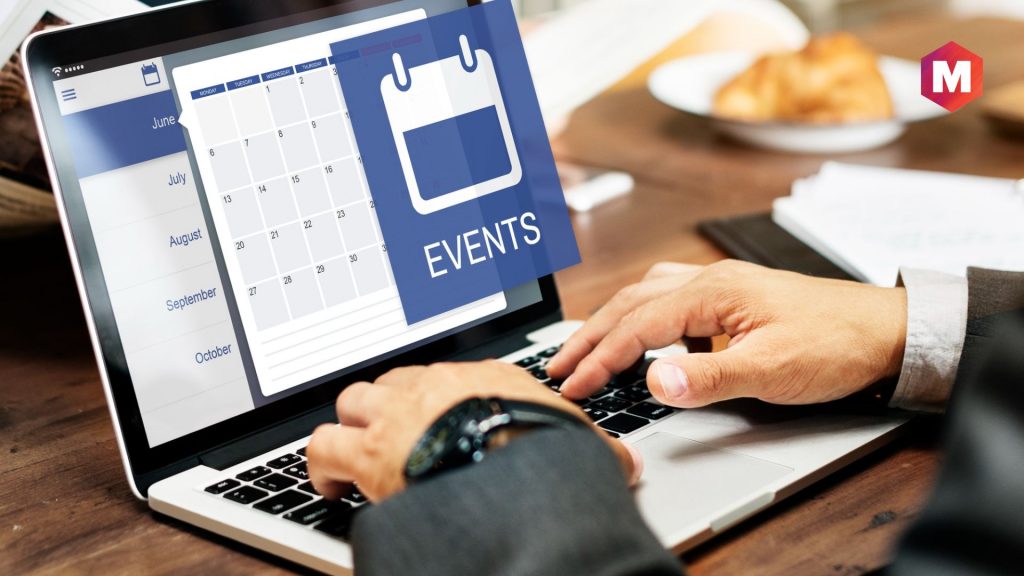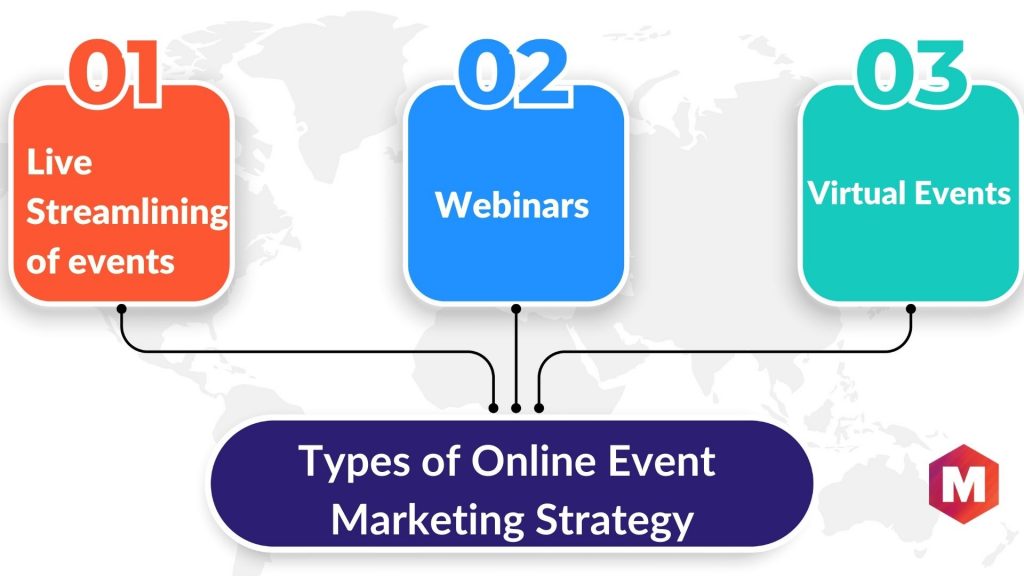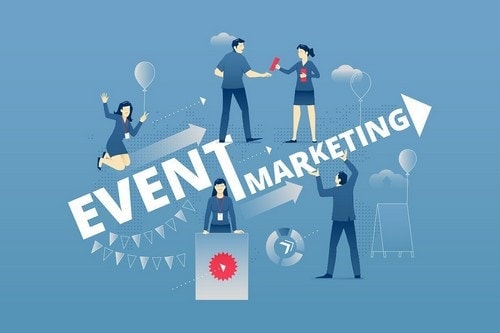Event marketing allows businesses to promote their brand, product, or service by interacting directly with customers. This customer engagement might occur online or in person. Companies can arrange their events and collaborate with others to host, participate in, or sponsor them. Event marketing is an excellent way to connect with your target audience, promote your brand, and achieve your online or in-person objectives.
Table of Contents
What is Event Marketing?

Event marketing is a marketing method that involves direct and face-to-face contact between the prospective buyer and seller at unusual events. These events can include Trade fairs, Concerts, sports events, exhibitions, and others.
When the customer is king, event marketing tactics engage the target audience and offer them a direct feeling of a company’s focal point, perspective, and personality, making them more likely to buy from them. Event marketing goes beyond product or service information. It offers free samples, interactive displays, discounts, and other ways for potential customers to try the product.
Unlike traditional forms of marketing (such as digital marketing), event marketing focuses on targeting prospective consumers and aims its promotional campaign toward them. Companies strive first to identify the target prospective consumer and then create an experience that will be memorable to them and thus motivate them to purchase their product or service.
Key Takeaways
- Event marketing requires direct involvement at trade fairs and concerts to engage the target demographic.
- Its goal is to provide consumers with a direct experience of a company’s brand, increasing their willingness to buy.
- Strategies go beyond information sharing to include complimentary samples, interactive displays, and discounts.
- It focuses on discovering and delivering memorable experiences for prospective customers to encourage purchases.
How does event marketing work?
Event marketing uses a variety of tactics to promote events. Companies can primarily plan and run their events. These events range from private workshops to large conferences, with objectives such as increasing customer loyalty, networking for new collaborations, and obtaining future client information.
Alternatively, businesses may attend industry events as attendees. A firm’s delegate could use this opportunity to highlight their offerings or boost their brand’s reputation by exhibiting extensive industry knowledge. Another effective way is to sponsor numerous events, dramatically increasing a brand’s visibility.
Regardless of the method, marketers universally recognize event marketing as a critical approach to achieving business goals.
Why is Event Marketing Important?
Event marketing is essential because it’s the best way to generate and reinforce new leads. It’s also a great way to build brand awareness for your brand and get people talking about you.
Event marketing boosts a brand’s credibility by allowing partners and clients to interact directly. 75% of entrepreneurs find it great for networking and creating essential connections.
Event participation, a vital feature of a great lead generation strategy, lets organizations connect directly with relevant and interested audiences, frequently turning them into engaged customers and advocates.
Events also boost customer loyalty. People can escape the routine, make critical contacts, and have unique experiences at these meetings. This improves relationship marketing by increasing their expertise and emotional connection to the firm.
Unexpectedly, event marketing boosts a brand’s web visibility. With 48% of millennials sharing event attendance on social media, a company’s reach and visibility can enhance brand awareness.
Types of Physical Event Marketing Strategy
Event marketing is the process of creating an experience to draw in customers. It’s about creating something that will get people talking and can take many forms. Some of the most popular types of physical event marketing are trade shows, in-person marketing events, conferences, seminars, and summits.
1. Trade fairs or tradeshows
Wikipedia defines a trade show or fair as “an exhibition organized so that companies in a specific industry can showcase and demonstrate their latest products and services.” Marketers can organize trade shows or participate in them, allowing prospective consumers to see and test their products upfront.
2. Conferences or seminars
Conferences or seminars are events organized by a company to promote their offerings. Here, a few targeted consumers are invited to attend the conference and get information about the offerings. They might also be given small samples of the company’s product or service.
3. Summits
Unlike conferences and seminars open to the general public, Summits are meant for industry leaders, highest-level executives, and government officials. Consisting of essential speakers, summits are high-profile and smaller in scope and aim to discuss ideas and finalize significant deals.
Types of Online Event Marketing Strategy
There are many different types of online event marketing strategies:
1. Live streamlining of events
As the name suggests, live events focus on streaming an event live to your prospective consumers. These online events are aimed at consumers who are interested in an event but need help physically attending the event.
2. Webinars
Webinars are seminars delivered via the web. The webinars can be in real-time or on-demand and include discussions, workshops, and presentations – all related to the product or service offered by the firm organizing the webinar.
3. Virtual events
Virtual events are the last type of online event marketing. They allow event attendees to participate in a virtual setting with the look and feel of an offline event. An example of a virtual event is an actual program that happens in real-time. However, some participants who cannot attend the actual program can visit the virtual event, i.e., a virtual booth, collect materials, ask questions, and even meet the staff.
How Effective is Event Marketing?
Event Marketing 2018: Benchmarks and Trends report says that 80% of Marketers believe event marketing is the single most successful marketing channel.
In another report by the Event Marketing Institute, 58% of event marketing consumers went on to buy the marketed product after the event. The same report also states that 86% of these buyers became regular buyers of that particular product or service. The success of event marketing can be gauged by the fact that 44% of marketers claim to get a 3:1 return on investment through event marketing.
Such has been the success of event marketing, and Forrester Research says that by 2020, 3.2 million global professional events will be held yearly.
Role of Event Marketing
1. To understand the buyer’s perspective
One of the foremost reasons businesses opt for event marketing is to get a pulse on the authentic buyer’s perspective. Having a face-to-face conversation lets organizations get authentic insights and buyer feedback. This helps them understand the buyer’s needs and how he perceives their product or service. This information then helps them improve their product or service.
2. Branding and real-time experiences help increase buyer’s loyalty
Since event marketing helps consumers connect to the organization in personal and focused ways, customers perceive it to be an emotional connection in an increasingly digital world and thus remain loyal to the brand. Reports on experiential marketing report that 72 percent of customers view brands that offer quality events positively.
3. Increase social media engagement
Event marketing is an effective way to boost the brand’s social media engagement. Businesses strategically use social media to drive social media engagements before a live event or after a live event. Some steps that help them increase their social media engagements are offering prizes, discounts, coupons, organizing contests, or even posting pre-event or post-event photographs. The above helps them engage their consumers and thus build their brand’s community.
4. Lead generation
Event marketing, such as trade shows, helps businesses generate leads immensely. Since the target demographic consumers are present in the trade shows they participate in, they have a greater chance of getting leads on prospective consumers.
Event marketing is beneficial if done correctly and is one of the preferred marketing methods. You can also use the amount of leads you received to measure your event success.
The benefits of event marketing
Event marketing has many benefits for your business:
- Creating a solid brand aura before, during, or after an event
- Prospecting business leads
- Enhancing brand value
- Leading new business ventures
- Promoting a product or trait
- Increasing customer satisfaction, involvement, and loyalty
Event planning gives your supporters and associates a practical and tangible engagement touchpoint to boost their ROI.
Current consumers choose products at their own pace, taking time to think. As a trade promoter, you must seize every opportunity to create rapport, goodwill, and consumer trust.
Investing time and money in event marketing might pay off when connecting with customers.
Common problems that event marketing can solve
Event marketing is an interactive and dynamic approach to addressing current company concerns. Let us look at how it can help solve common business problems:
- Diminishing Brand Recognition Solution: Launching a brand into the spotlight is critical. Participating in interactive events can provide a live platform for communicating your business’s vision and values, increasing brand recognition. In the excitement of an event, your company can connect with participants, giving a lasting impression of what your brand stands for.
- Inadequate Lead Generation Solution: Events provide an excellent opportunity for businesses seeking fresh leads. Positioning your brand at an event with a high concentration of your desired customer profile will help you gain exposure to potential leads more likely to be interested in your product or service.
- Customer Disengagement Solution: In today’s marketing landscape, engagement is critical, and events offer a unique opportunity for human connections. They provide a forum for retaining and cultivating loyalty among existing clients by showing new offerings that can better meet their demands.
- Low Event Turnout Solution: A successful event hinges on its attendance. To engage an audience, offer valuable learning and networking possibilities. Recruit notable speakers who can provide unique insights that connect with your audience’s interests, boosting your status as a thought leader.
- Questionable Event ROI Solution: The effectiveness of event spending is frequently questioned. To decipher the ROI, event objectives must be aligned with broader business and sales goals. These measurements should be established to track the event’s impact once it occurs accurately.
How to drive demand to your events
Organizing an event can significantly increase your brand’s recognition. However, completing your attendance list is critical to maximize your investment return on event branding. Here’s a roadmap for developing an outstanding event marketing strategy:
Revisit your Past Audience
In digital marketing, every click or online interaction has the potential to generate leads. Take advantage of these encounters by using remarketing strategies. For example, add a remarketing tag to your event’s marketing landing page in collaboration with a digital marketing specialist. This way, people who connect with your page may later see an advertisement for your event on platforms such as Google and Facebook. A solid strategy for assembling an audience relevant to your event.
Generate Engaging Content
Creating interesting long-form content is another strategy that can stimulate your audience’s interest, increase brand recognition, and position you as a subject matter expert. Research your field and rivals, collaborate with industry experts, and broadly disseminate your content. Include a compelling call to action (CTA) for your event at the end of each item. A diverse set of articles or blog entries might be the foundation for more significant content marketing efforts.
Utilize Social Media Channels
To increase event sign-ups, prioritize social media efforts. Create eye-catching images and captivating content that will entice your audience to click on your event page and join. You can create tailored campaigns using platform-specific keyword lists, subject categories, and geographic targeting. Tweepi, for example, can help you grow your following and engage folks interested in your competitors.
ROI of a successful event marketing program
Assessing the Return on Investment (ROI) of a successful event marketing program may be a complex undertaking compared to other marketing channels, but the data gathered is invaluable. Consider the following characteristics of event marketing:
- Importance: It is worth noting that more than 40% of marketing professionals see live events as the most essential marketing channel in their campaigns.
- Trending upwards: The number of corporations hosting 20 or more events yearly increased by 17% between 2017 and 2018.
- Excellent at Building Rapport: According to a Bizzabo study, 95% of participants believe that live events provide attendees with a valuable opportunity to develop in-person affiliations in an increasingly digital environment.
These three essential elements of event marketing–its critical importance, trending growth, and unique ability to develop relationships–make its ROI worthwhile despite the complexity of its evaluation. However, precisely assessing and genuinely comprehending the ROI of a successful event marketing program can give a business a competitive advantage, significantly improving its marketing performance and strategy.
How to plan, implement, and optimize your event marketing program
Developing a strategic framework for your event marketing program is critical to ensure its success. You may engage your target audience, encourage promotional activities, and increase sales results by combining concentration, ingenuity, and rigorous planning. Here’s how to excel in event marketing:
Step 1: Establish Clear, Impactful Goals
- Begin with a clear picture of what you want to achieve. Remember, financial results must be considered from the start to provide a solid return on investment (ROI).
- Expand your goals beyond basic attendance statistics. Aim for goals that will significantly influence your sales pipeline and revenue.
Step 2: Embrace Creativity and Establish a Compelling Theme
- Your event should stand out. If it is a physical gathering, why not use enjoyable activities like virtual reality experiences to keep people’s attention? Consider visually engaging presentations and interactive sessions when planning an online event.
- Use gifts to generate attention but with a twist. Consider environmentally friendly merchandise or digital prizes that align with your target audience’s ideals.
Step 3: Effective Segmentation and Promotional Strategies
- Segmenting your audience allows you to tailor your promotional efforts and ensure that your message reaches the most relevant audience.
- Use your data efficiently in future campaigns. Engage with your audience on various social media platforms to increase visibility and interaction before, during, and after the event.
- Email promotions, when combined with social media involvement, can significantly increase the visibility of your event.
Step 4: Select the Appropriate Event Technology
- Your choice of platform can make or break your virtual event. Consider your priorities, such as dependability, usability, or great assistance.
- Implement a marketing automation system to streamline your processes and keep them efficient, quantifiable, and scalable.
Step 5: Precise Measures for ROI
- Use a solid foundation to measure your event’s ROI effectively. Understand how each guest progresses from invitation to engagement and beyond.
- Segment leads to find the most lucrative opportunities and track how they progress through your sales funnel.
- To get a complete picture of your event’s financial impact, analyze the opportunities created, the pipeline generated, the deals closed, and the cost per opportunity.
Event Marketing Examples
Here are a few examples of event marketing success that you can use to invite event attendees and apply your event strategies.
1. User Conferences
User conferences are one of the most common types of events (like corporate events), and they can be an excellent way to get your brand in front of your target audience.
By hosting a user conference, you can allow your customers to meet each other, exchange ideas, and collaborate. This type of event is also a great way to demonstrate that you’re listening to customer feedback and responding to it by implementing changes or offering new features.
2. Seminars
Seminars are another type of event that can be used for marketing purposes. These events are more formal than user conferences and involve an expert presenting on a particular topic.
For example, if you’re selling cars, then your seminar might focus on how to maintain your car’s engine or how to get good gas mileage out of it; these topics would be relevant to all participants regardless of whether they own a car or not since it affects everyone’s lives in some way!
3. Networking Events
A networking event is a great way to meet people with similar interests and discover their work. It’s also an excellent opportunity for event marketers to network with people who can help you grow your business. If you want to expand your connections, this is one of the best ways to do it!
4. Hackathons
Hackathons are another type of event where you can network with other professionals in your industry by having your event website. Hackathons are short competitions where groups of people work on projects together for a limited amount of time. They’re usually held over 24 hours or so, and they can help you meet people who share your interests and goals for your company’s future.
5. Virtual Events
Virtual events (hybrid or live events) are a great way to connect with your audience. Event planners can hold the event virtually, via a webinar or Google Hangout, or you can hold them in person—and sometimes both!
The key to making a virtual event successful is creating an environment where people feel comfortable and welcome. You want people to feel like they can ask questions and get answers without fear of judgment or criticism. Make sure your event technology is set up correctly, and you have enough time set aside at the end of the event for Q&A—you don’t want to cut people off before they’ve had their chance to speak up!
6. Community Events
Community events benefit brands that want to create more intimate relationships with customers and potential clients by allowing them access to their community space and offering them opportunities to get involved and interact with each other in real time.
Community events also allow companies to show off their products/services in action (or even develop new ones), making them feel more authentic than traditional advertising campaigns.
Conclusion
Event marketing is a highly effective method that enables organizations to interact directly with their target audience, resulting in memorable and engaging experiences. It promotes lead creation, builds brand loyalty, improves consumer engagement, and greatly increases return on investment. \
Companies may reach out to their target audience more personally and effectively by combining physical and virtual events, resulting in better relationships and higher brand visibility.
I have frequently asked questions about Event Marketing.
What is the definition of event marketing?
Event marketing promotes a brand, product, or service through a large-scale event. For example, brand representatives could attend a large convention or event to inform consumers directly about their products or services.
It is critical to avoid mixing up event marketing and event management. Event management entails arranging, promoting, and operating events.
What is an example of event marketing?
Businesses frequently promote their products or services at trade shows, conferences, and exhibits. This practice is referred to as event marketing.
In event marketing, businesses may employ booths, tables, or stands to interact with attendees.
Why do companies use event marketing?
Companies promote themselves at special events where people interested in their business can meet. These gatherings are excellent opportunities to meet people who may decide to purchase items for a firm. Marketing at these events can increase brand awareness and assist the company in selling its products or services.
Liked this post? Check out the complete series on Marketing




Thank you Hitesh ji for your mindful article. Love from Nepal.